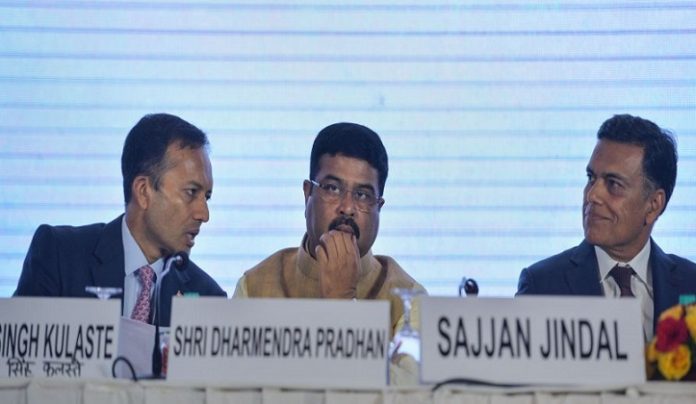By Our Correspondent
BHUBANESWAR/NEW DELHI: Iron Ore prices offered by Central and State PSUs like National Mineral Development Corporation(NMDC), Odisha Mining Corporation and subsequent Steel prices set by Steel PSUs like Steel Authority of India Ltd and Rashtriya Ispat Nigam Ltd, has worried Big private Steel makers. One of India’s largest integrated steel companies Jindal Steel and Power Ltd led Naveen Jindal, has said the Union Steel and Mines Ministries should resist the temptation to cap prices of the Steel commodity and not set a benchmark on profitability in an open economy.
As per official figures, India’s iron ore export increased by 70.26 per cent to 29.261 MT in the April-September period of ongoing fiscal over 17.186 MT in the year-ago period. After implementation of the amended mining law, 28 operative mines (24 iron ore, iron and manganese ore, and chrome ore mines in Odisha, and 4 iron ore mines in Karnataka) that expired on March 31, 2020 have been successfully auctioned. As against a production of 123.8MT iron ore in Odisha from Jan 2019 to Nov 2019, total production in the same period in current year has been only 98.2MT. Out of the recently auctioned 24 mines in Odisha, only 5 have been able to start production and dispatch till date. This is the main reason for shortfall in iron ore supply in the country.
Addressing a webinar organised by Care Ratings, V R Sharma, the managing director of JSPL said the government should instead lead by example by asking PSUs like Steel Authority of India Ltd and Rashtriya Ispat Nigam Ltd to reduce prices. He further said mining PSUs like National Mineral Development Corporation — the largest iron ore miner in the country, and Odisha Mining Corporation should similarly reduce prices of iron ore — one of the key raw materials for steel making, which would also lay the ground for steel companies to bring down prices.
“Steel prices have gone up in India but it is in line with global trends. Our costs have also gone up as iron ore prices have increased too,” Sharma said. “Steel companies have been carrying losses in their books for so many years and this (high prices) will enable us to offset those losses. Profit is not bad, even the government earns more money through GST when prices are high. In an open market economy, nobody can say how much profit a company can make. You can punish us if there are unfair trade practices like hoarding of goods or cartelisation.”
Prices of hot rolled coil have increased 46 per cent to Rs 52,000 per tonne in November compared to Rs 37,400 per tonne in July this year. Similarly rebar TMT used in housing and construction sectors has touched Rs 50,000 a tonne. This kind of increase is affecting steel consuming industries like infrastructure, real estate, automobile and consumer electronics, where demand is still relatively muted which limits their scope to pass on the price increases to end consumers.
Earlier this month, while addressing a Minerals, Mining and Metals e-Conclave organised by the Bengal Chamber of Commerce and Industry, JSPL Chairman Naveen Jindal, had said ““Whether it is coal blocks or iron ore blocks, the government cannot be a hoarder, the government has to take out a lot of these blocks…what are these for? Why should the government (whether State or Central) think that it will only bring few blocks at a time because it wants to maximise on the premiums and the industrialists think there is so much of competition……when the government creates this artificial scarcity, people end up paying huge premiums. We have seen this happen in coal and iron ore and every other mineral and then they become unsustainable,”.
Meanwhile, as many as 500 mineral blocks spreading across all mineral bearing States including Odisha, will be put for auction in 2021. Mines Ministry hoped that the reforms are likely to be approved in the month of January which will involve some changes in the MMDR Act (Mines and Minerals (Development and Regulation) Act, 1957) and some changes in the rules all meant to liberate the sector.
In recent 24 auctioned Mines blocks under Joda-Koira-Rairangpur and Sukinda circles under Keonjhar,Sundargarh, Mayurbhanj and Jajpur , operations , only 5 have so far started operations while rest keeping quite. Jajang, Nuagaon, Narayanposhi, Ganua iron ore mines of the JSW Steel Limited, Thakurani iron ore mine of M/s Arcelor Mittal have started operations but others yet to resume operations.
In 2016, the State Government had auctioned Sagasahi Iron Ore Block, which was bagged by EASSR Steel and later in 2017, the Government had auctioned Netrabandha and Kolmo Iron Ore block that were bagged by Bhushan Group , all 3 were virgin blocks, production of which is yet to started even after 5 years.In total, 27 auctioned mines with 5 only operational making revenue and employment loss, shortage of materials affecting medium and small scale industries and hitting export and imports of minerals in Odisha, sources said adding royalty, DMF and NMET also.



























